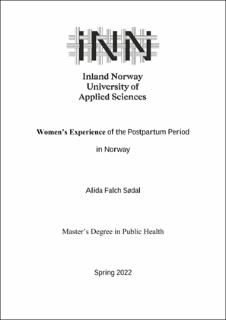| dc.description.abstract | The postpartum period is a pivotal life change, affecting over 50k birthing women in Norway each year. The need to understand how women experience and view this period of life stems from the fact that it is a neglected aspect of maternity care. It is the part of maternity care women are least satisfied with, which is true for both international as well as national evidence. In addition to this, the covid-19 pandemic has negatively impacted mother’s mental health in Norway and show similar trends in international findings.
The aim of the study was to investigate how women experience the postpartum period and the postpartum health services. Furthermore, the study looked at how women experienced the health services received at the postpartum ward, the public health clinic, and how women viewed the 6-week postpartum visit. The study utilized a qualitative approach, with a phenomenological design. The study investigated mothers own lived experiences of the postpartum period using semi structured interviews. Fourteen participants aged 23-39 were recruited either through public health clinics using a gatekeeper in Inland County, or via social media. The interviews were analysed using thematic analysis, using the software program OpenCode 4.03.
Two themes emerged from the analysis, namely positive and negative experiences during the postpartum period. Negative experiences regarded the health professionals at the postpartum ward as too busy, and there was a lack of continuity in the care they received. Several women struggled to successfully initiate breastfeeding and felt the information, help and guidance as lacking. Women also noted several shortcomings in the public health services, resulting in the use of costly private services. Furthermore, covid-19 had impacts on women’s access to social events, which also led to feelings of isolation. In contrast, some women experienced social restrictions as a positive, where less social contact contributed to a quiet and calm postpartum period. Other positive experiences included good quality of health services at the hospital, positive experiences of the municipal public health clinics and that the partner was essential to a sense of security.
These findings show clear areas for improvement in the postpartum health services, both at the postpartum ward, at the public health clinics and the 6-week postpartum follow-up. Women felt a lack of continuity in care, the health professionals at the hospital were too busy, women struggled to initiate successful breastfeeding and women were discontent with the 6-week postpartum follow-up. In addition to this, women experienced feelings of isolation and a loss of social arenas due to covid-19 restrictions.
Even though covid-19 was noted as a contributing factor, it can be argued that some of the experiences of health services indicate a general lack of good care. Further research is needed to uncover whether there is a systematic lack of good care, or if the negative experiences from this study are due to covid-19 and restrictions that followed. The study additionally implicates that policymakers should concentrate their efforts on fulfilling the criteria of the AAAQ-framework, as the findings show that women utilized privately funded health services. In this way postpartum health services can be seen to contribute to widening the social inequalities in health in Norway. | |
